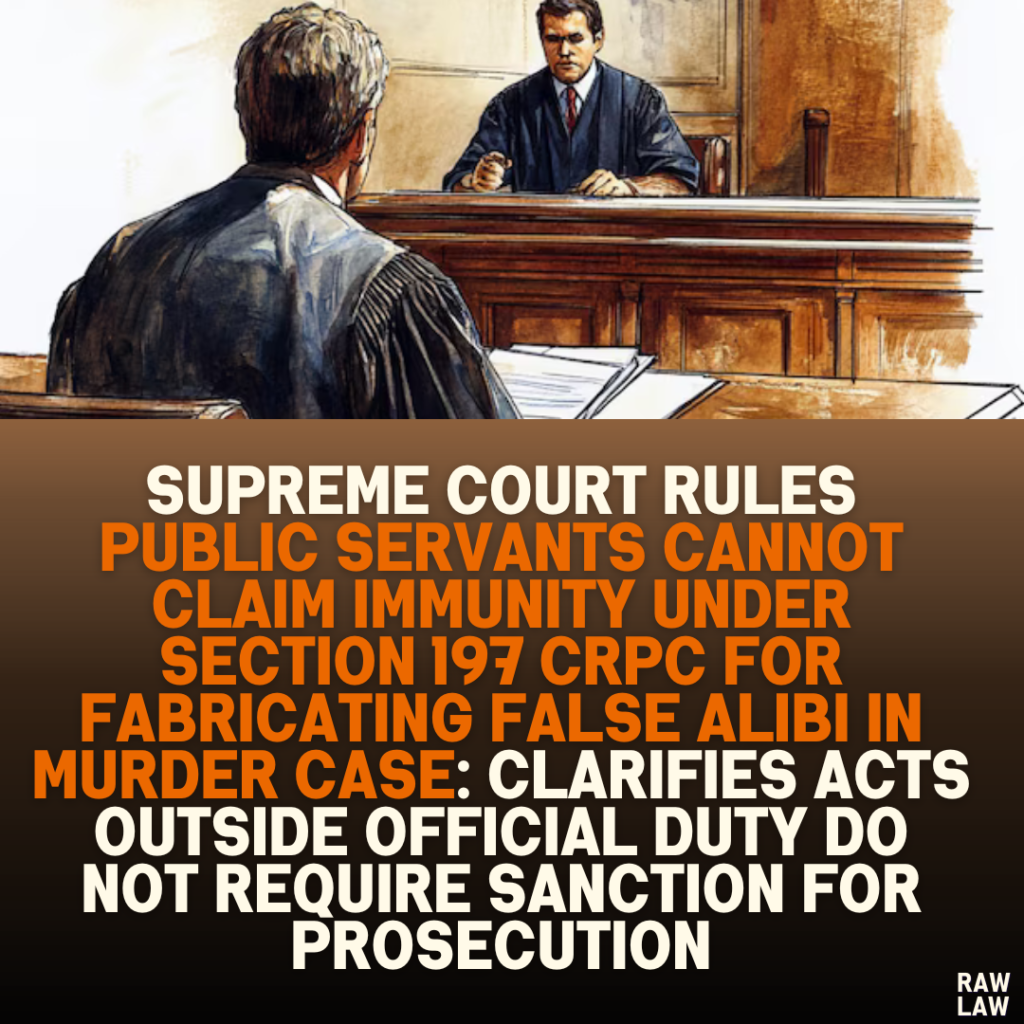Court’s Decision:
The Supreme Court reversed the High Court’s decision, allowing criminal proceedings against public servants accused of fabricating a false alibi for the main accused in a murder case. The Court clarified that the alleged acts were outside the purview of their official duties and, therefore, did not require sanction under Section 197 CrPC.
Facts:
- Incident and FIR Registration:
- On 12 October 2007, a murder occurred in Firozabad, Uttar Pradesh, where the appellant’s brother was killed, and his nephew was grievously injured. A First Information Report (FIR) was lodged against the accused, Ashok Dixit, and others under various sections of the Indian Penal Code (IPC).
- On the same day, another FIR was lodged in Gwalior, Madhya Pradesh, under Section 34 of the Excise Act, claiming Ashok Dixit was arrested with illegal liquor.
- Allegations of Conspiracy:
- The appellant alleged that the Gwalior FIR was fabricated by police officers to create an alibi for Ashok Dixit, showing his presence in Gwalior at the time of the Firozabad murder.
- Investigations and Charges:
- Investigations in Firozabad revealed collusion among police officials in Gwalior. A charge sheet was filed against the officials under Sections 147, 148, 149, 307, 302, 201, and 120-B IPC, accusing them of conspiracy to shield Ashok Dixit.
- Proceedings in the High Court:
- The Allahabad High Court quashed the criminal proceedings against the police officials, holding that their acts were in the course of their official duties and required sanction under Section 197 CrPC.
Issues:
- Whether the acts of the accused police officials were part of their official duties, thus requiring sanction under Section 197 CrPC.
- Whether the High Court erred in quashing the proceedings against the accused.
Petitioner’s Arguments:
- Acts Beyond Official Duty:
- The petitioner argued that fabricating a false alibi and colluding to obstruct justice were not official duties of the police officers.
- Actions constituting criminal conspiracy and misuse of authority cannot attract immunity under Section 197 CrPC.
- Evidence of Conspiracy:
- Statements from independent witnesses indicated that the accused officials actively participated in creating a false case in Gwalior to protect Ashok Dixit.
- Witnesses testified that the officials, including respondent no. 1, openly assured Ashok Dixit of protection from the murder charges.
- High Court’s Error:
- The petitioner contended that the High Court misapplied the law by quashing the proceedings based on the absence of prosecution sanction.
Respondent’s Arguments:
- Official Duty Defense:
- The respondents claimed that the acts alleged against them were connected to their roles as police officers and thus required sanction under Section 197 CrPC.
- Lack of Evidence:
- The respondents highlighted contradictions in witness statements and a lack of direct evidence linking them to the alleged conspiracy.
- Procedural Safeguards:
- They argued that their actions were in accordance with procedures under the Excise Act and were done without malicious intent.
Analysis of the Law:
- Section 197 CrPC Overview:
- Section 197 CrPC provides immunity to public servants for acts done in the discharge of their official duties, requiring prior sanction for prosecution.
- The key question is whether the alleged acts were performed “while acting or purporting to act” in the discharge of official duties.
- Judicial Precedents:
- The Supreme Court analyzed precedents, including:
- Matajog Dobey v. H.C. Bhari: Sanction is required only if there is a reasonable connection between the act and official duty.
- Harihar Prasad v. State of Bihar: Criminal conspiracy is not considered an official act, and no sanction is required.
- B. Saha v. M.S. Kochar: Acts of misuse of position or authority are not protected under Section 197.
- The Supreme Court analyzed precedents, including:
- Application to the Present Case:
- The alleged acts of fabricating a false alibi and conspiring to shield a murder accused had no connection with the legitimate duties of the police officers.
- The actions were manifestly illegal and aimed at obstructing justice, disqualifying them from immunity under Section 197.
Precedent Analysis:
The Court extensively referred to prior rulings to reinforce the principle that:
- Acts must be integrally connected to official duties to attract immunity.
- Fabrication of false evidence or misuse of authority for illegal purposes cannot be deemed as part of official duties.
- Criminal conspiracy and obstruction of justice are inherently outside the scope of Section 197 CrPC.
Court’s Reasoning:
- Nature of the Alleged Acts:
- The Court observed that creating a false alibi and obstructing justice were deliberate violations of the law and bore no nexus to the lawful discharge of official duties.
- Intent of Section 197 CrPC:
- The section is meant to protect honest public servants from vexatious litigation, not to shield unlawful activities.
- High Court’s Error:
- By equating illegal acts with official duties, the High Court erroneously extended immunity under Section 197 to acts of criminal conspiracy.
Conclusion:
The Supreme Court held that:
- Sanction under Section 197 CrPC was not required for prosecuting the respondents.
- The proceedings against the respondents were restored, enabling the trial to proceed.
Implications:
- Accountability of Public Servants:
- Public servants cannot misuse their official positions under the guise of performing official duties.
- Reinforcement of Legal Principles:
- The judgment reinforces the boundaries of immunity under Section 197 CrPC, ensuring it is not misused to escape liability for unlawful acts.
- Deterrence Against Abuse of Power:
- The ruling serves as a deterrent against the misuse of authority by public servants, promoting adherence to lawful conduct.
